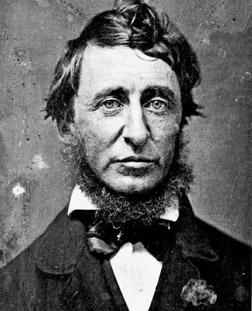 By July 1846, the naturalist, slavery abolitionist, and writer Henry David Thoreau had been resisting the payment of poll taxes that helped fund the Mexican-American War for six years. He was arrested for refusing to pay and spent a night in jail. Though someone, likely his aunt, paid his back taxes and got him out the next day, his brief time in jail had a profound influence on him. A few years later Thoreau published the essay Civil Disobedience, containing his famous line, “If a thousand men were not to pay their tax-bills this year, that would not be a violent and bloody measure, as it would be to pay them, and enable the State to commit violence and shed innocent blood.”
By July 1846, the naturalist, slavery abolitionist, and writer Henry David Thoreau had been resisting the payment of poll taxes that helped fund the Mexican-American War for six years. He was arrested for refusing to pay and spent a night in jail. Though someone, likely his aunt, paid his back taxes and got him out the next day, his brief time in jail had a profound influence on him. A few years later Thoreau published the essay Civil Disobedience, containing his famous line, “If a thousand men were not to pay their tax-bills this year, that would not be a violent and bloody measure, as it would be to pay them, and enable the State to commit violence and shed innocent blood.”
Also in that essay, he wrote, “Practically speaking, the opponents to a reform in Massachusetts [to abolish slavery] are not a hundred thousand politicians at the South, but a hundred thousand merchants and farmers here, who are more interested in commerce and agriculture than they are in humanity, and are not prepared to do justice to the slave and to Mexico, cost what it may. I quarrel not with far-off foes, but with those who, near at home, co-operate with, and do the bidding of those far away, and without whom the latter would be harmless.” As war tax resisters, we refuse to “do the bidding of those far away” who want to spend our taxes on endless war. Despite our distance from the conflicts the US government funds, we still recognize how taxation compels our participation in war, and how refusing to pay brings attention to this reality.
Throughout the month of July, the National War Tax Resistance Coordinating Committee is celebrating the contributions of Thoreau to our modern movement. Join us by:
- Reading Civil Disobedience
- Reading/purchasing NWTRCC’s Thoreau and His Heirs educational materials
- Contributing to our Causevox fundraising campaign
- Starting your own Causevox peer-to-peer fundraising page in support of NWTRCC (click “Create a fundraising page” at the top, or the red “Fundraise for NWTRCC” button)
- Sharing this blog post with your friends using the share buttons below




